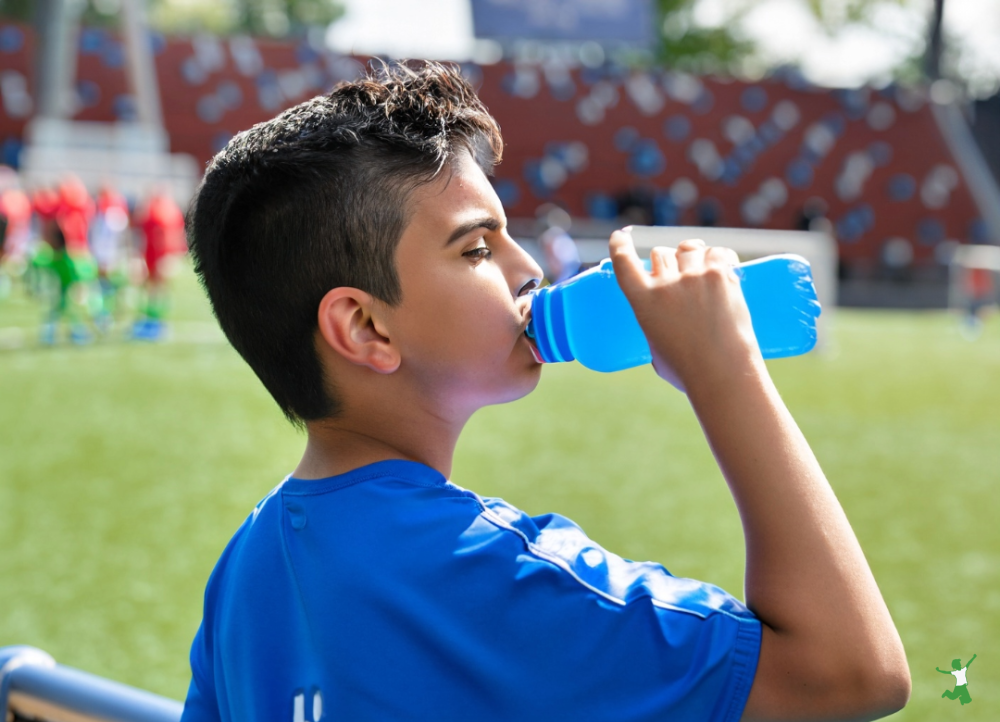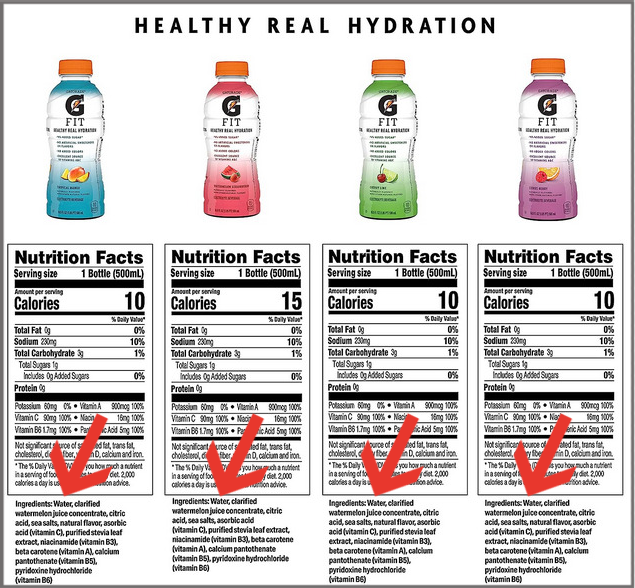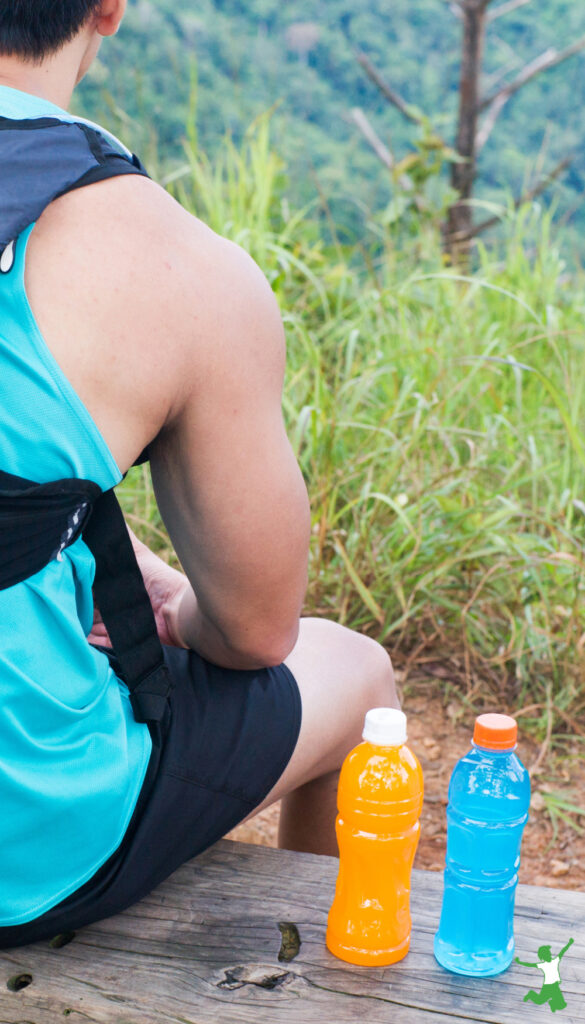Healthy electrolyte and sports drink substitutes to avoid the GMOs, stealth artificial sweeteners, tap water, and artificial additives of commercial brands including Pedialyte.

I have to admit that it makes me sad to see children at athletic events toting around giant bottles of commercially made sports drinks like Powerade or Gatorade.
On top of being loaded with sugar and/or artificial sweeteners, colors and a myriad of chemicals, research has demonstrated that they are damaging to teeth. According to the journal General Dentistry, non-cola drinks, commercial lemonades, and energy/sports drinks showed the most degradation of tooth enamel. (1)
The good news is that more parents becoming aware of the risk of sports drinks to their children’s health and teeth. However, instead of creating healthier options, beverage manufacturers responded by labeling sports drinks “reduced sugar”.
This is commercial food industry lingo for the blending of artificial sweeteners with GMO sugar or high fructose corn syrup to bring the sugar per serving in line with politically correct “nutritional guidelines”.
Artificial Sweeteners in Most Sports Drinks
Sucralose and aspartame (Nutrasweet) are two common artificial sweeteners in sports drinks. As mentioned above, manufacturers often blend them with calorie containing sweeteners to masquerade as “healthier”, low sugar options.
The documented dangers of aspartame are discussed at length in the must read book Excitotoxins by neurologist Dr. Russell Blaylock.
Sucralose is most popularly known by the brand name Splenda. The health dangers of sucralose are many including:
- Reduction in the number and quality of beneficial gut flora. (2)
- Digestive breakdown into unknown and untested compounds with uncertain health implications. (ibid)
- Disruption of crucial insulin/glucose/glucagon regulation. (ibid)
- Insulin resistance and the development of type 2 diabetes. (3)
- Elevation of risk for coronary heart disease. (4)
- Weight gain and obesity. (ibid)
- Shrinkage of the thymus gland with potential negative impacts to the immune system. (5)
Another dangerous artificial sweetener is acesulfame potassium also known as acesulfame K or Ace K for short. Like sucralose, use also risks weight gain and gut flora disruption.
Warning: acesulfame potassium is often mistaken as an electrolyte when appearing on a sports drink nutritional label.
In my view, acesulfame potassium is a stealth artificial sweetener favored by manufacturers.
It confuses a lot of consumers as it looks like an electrolyte, and allows the product to have a “healthier” looking nutritional label. In reality, the product is toxic!
Tap Water
One of the worst aspects of bottled sports drinks is that they are virtually all made with tap water.
This means chlorine, fluoride and other toxins commonly found in tap water are being chugged down by your children causing high levels of exposure that is totally unnecessary.
Even the sports drinks marketed as “healthy” (such as this brand) are made with tap water!
Yes, this includes Pedialyte!
The use of tap water in these products can come as quite a shock for families that take great care to filter their drinking, bathing, and cooking water at home.
Be sure to eliminate ALL sources of tap water for your growing children, yourself, and family.
A big source of unwitting exposure is toxic sports drinks!

Healthy Sports Drink Substitutes
Over the years, I’ve posted dozens of healthy drink recipes on this blog as options to help people who are trying to eliminate dependence on sports drinks, soda, or processed juice.
Which of these is best to use if you are weaning your children off commercial sports drinks?
My top five list is below. It is a condensed lineup of easy options that you can either make or buy.
Water with Electrolytes
Plain filtered water is the easiest substitute for commercial sports drinks. I see more and more coaches emphasizing this with their players, which is very encouraging!
Filtered water mixed with a few drops of concentrated sea mineral electrolytes in a nontoxic, reusable bottle is best (I like these).
This homemade electrolyte drink is great to make ahead if you are so inclined.
You can also add a teaspoon of homemade solé water to a glass of filtered water as an inexpensive form of ionic minerals.
If you must buy bottled water, structured water with added electrolytes is a good way to go (and please recycle those bottles!).
Homemade Hydration Drink
Our family’s favorite pre and post fitness hydration beverage is a glass of filtered water with a pinch of sea salt and a squeeze of fresh lemon.
This is by far the best sea salt brand on the market, by the way. It is the highest in trace minerals and tested free of microplastics (a big problem in sea salt these days).
I serve a couple of glasses of this one or two days before competition and then again after the event.
This helps ensure proper hydration and electrolyte levels to reduce the chance of leg cramping. It also virtually eliminates the chance of post-competition dehydration headaches.
Coconut Water
Coconut water is a natural, isotonic beverage that quickly replenishes minerals. It tastes sweet and is a bit of an acquired taste for some, though many children take to it right away.
Be sure to buy unsweetened coconut water only. There are some with lots of added sugar!
This brand of coconut water is one of the best I’ve seen on the market. It is packaged in glass to avoid toxic packaging issues too.
Note: I do not recommend birch or maple water.
While these two options do replace electrolytes effectively, several issues give me pause about using them. Please refer to the linked articles for in-depth analysis.
Haymakers Punch (Switchel)
If your family prefers a more flavorful sports drink, try making homemade switchel.
“Switchy” is a traditional American beverage. For centuries, thirsty farmers have enjoyed it while harvesting hay. Hence, it is also known as Haymakers Punch.
This tasty electrolyte replacement beverage contains filtered water, raw apple cider vinegar, and raw (local) honey as the three basic ingredients.
Small amounts of ginger, cardamom, and/or turmeric powder add more flavor if desired.
DIY Energy Drink
Real fruit juice makes an excellent base for a healthy sports drink when diluted with filtered water and electrolytes.
This energy drink recipe I developed and use in our home provides a nice boost along with easy hydration without any added sugar or caffeine.
My recipe is based on Bragg’s line of apple cider vinegar beverages available at many healthfood stores.
By the way, I do not recommend buying from Bragg’s anymore due to the rapid decline of this once stellar company.
Have you ever tried making sports drinks yourself? What recipes do you like to use?

(1) Effects of sports drinks and other beverages on dental enamel
(2) Sucralose, A Synthetic Organochlorine Sweetener: Overview Of Biological Issues
(3) Sucralose Affects Glycemic and Hormonal Responses to an Oral Glucose Load
(4)Artificial sweeteners produce the counterintuitive effect of inducing metabolic derangements
(5) Shrunken glands spark sweetener controversy








I’ve been using the electrolyte sports drink formula from
marysnest.com
she includes:
Salt
Potassium chloride powder
Magnesium glycinate powder
Hmmmm. I would suggest a couple of things. She recommends plain white salt which is baffling. Why wouldn’t you use highly mineralized sea salt with natural electrolytes like potassium and magnesium already in there and then you don’t even need the other two ingredients? Processed white salt is best avoided.
I would suggest this instead. https://www.thehealthyhomeeconomist.com/homemade-electrolyte-replacement/
Hi Sarah, what is your take on the powder form electrolyte drinks? Personally we buy Cure and Jigsaw Health Pickleball. They are sweetened with stevia/monk fruit extract. Love your articles. Keep up the good work!
The powdered electrolyte brands I’ve looked at contain natural flavors and sometimes other additives that are undesirable, so I don’t recommend them.
Thanks for this informative article! Three of our kids played high school sports and I know the “sports drink” habit is a hard one to beat back. But a local doctor once recommended 1/4 teaspoon of salt in a glass (8 0z) of orange juice to replenish electrolytes. If I recall correctly the OJ is a source of potassium while the salt provides sodium. I would always use sea salt to get a little mineral boost.
I used to make an electrolyte drink with lemon juice, sea salt, a little milk kefir (for probiotics) and honey. I also sometimes added Hyland’s cell salts. These days we just use homemade salt sole – a teaspoon in a cup of water.
We see so many sports teams with those big “Gatorade” jugs on the sidelines. Good marketing for them I guess, but we always filled ours with water…
What a good read – helpful and well written 🙂